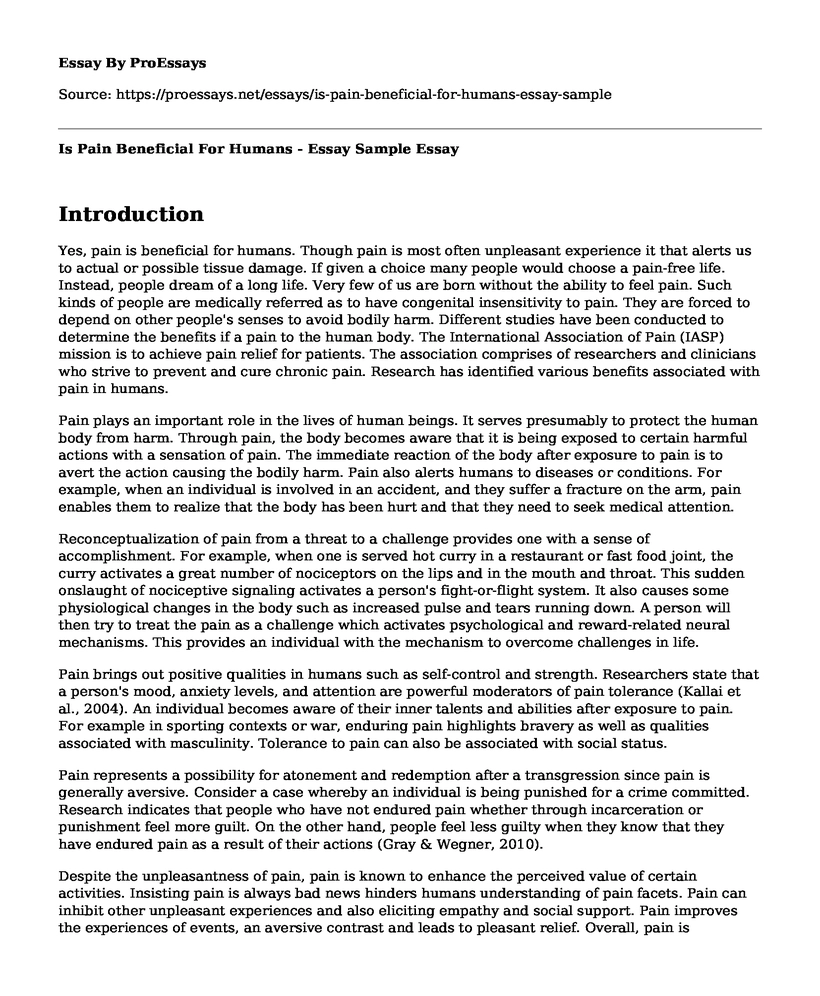Introduction
Yes, pain is beneficial for humans. Though pain is most often unpleasant experience it that alerts us to actual or possible tissue damage. If given a choice many people would choose a pain-free life. Instead, people dream of a long life. Very few of us are born without the ability to feel pain. Such kinds of people are medically referred as to have congenital insensitivity to pain. They are forced to depend on other people's senses to avoid bodily harm. Different studies have been conducted to determine the benefits if a pain to the human body. The International Association of Pain (IASP) mission is to achieve pain relief for patients. The association comprises of researchers and clinicians who strive to prevent and cure chronic pain. Research has identified various benefits associated with pain in humans.
Pain plays an important role in the lives of human beings. It serves presumably to protect the human body from harm. Through pain, the body becomes aware that it is being exposed to certain harmful actions with a sensation of pain. The immediate reaction of the body after exposure to pain is to avert the action causing the bodily harm. Pain also alerts humans to diseases or conditions. For example, when an individual is involved in an accident, and they suffer a fracture on the arm, pain enables them to realize that the body has been hurt and that they need to seek medical attention.
Reconceptualization of pain from a threat to a challenge provides one with a sense of accomplishment. For example, when one is served hot curry in a restaurant or fast food joint, the curry activates a great number of nociceptors on the lips and in the mouth and throat. This sudden onslaught of nociceptive signaling activates a person's fight-or-flight system. It also causes some physiological changes in the body such as increased pulse and tears running down. A person will then try to treat the pain as a challenge which activates psychological and reward-related neural mechanisms. This provides an individual with the mechanism to overcome challenges in life.
Pain brings out positive qualities in humans such as self-control and strength. Researchers state that a person's mood, anxiety levels, and attention are powerful moderators of pain tolerance (Kallai et al., 2004). An individual becomes aware of their inner talents and abilities after exposure to pain. For example in sporting contexts or war, enduring pain highlights bravery as well as qualities associated with masculinity. Tolerance to pain can also be associated with social status.
Pain represents a possibility for atonement and redemption after a transgression since pain is generally aversive. Consider a case whereby an individual is being punished for a crime committed. Research indicates that people who have not endured pain whether through incarceration or punishment feel more guilt. On the other hand, people feel less guilty when they know that they have endured pain as a result of their actions (Gray & Wegner, 2010).
Despite the unpleasantness of pain, pain is known to enhance the perceived value of certain activities. Insisting pain is always bad news hinders humans understanding of pain facets. Pain can inhibit other unpleasant experiences and also eliciting empathy and social support. Pain improves the experiences of events, an aversive contrast and leads to pleasant relief. Overall, pain is beneficial to humans, and thus through an unpleasant experience; humans should embrace.
References
Gray, K., & Wegner, D. M. (2010). Torture and judgments of guilt. Journal of Experimental Social Psychology, 46(1), 233-235.
Kallai, I., Barke, A., & Voss, U. (2004). The effects of experimenter characteristics on pain report in women and men. Pain, 112(1-2), 142-147.
Cite this page
Is Pain Beneficial For Humans - Essay Sample . (2022, Dec 01). Retrieved from https://proessays.net/essays/is-pain-beneficial-for-humans-essay-sample
If you are the original author of this essay and no longer wish to have it published on the ProEssays website, please click below to request its removal:
- Blood Pressure Analysis - Report Sample
- The Impact of Family Satisfaction on the Perception of Nursing Care Paper Example
- Essay Sample on Acute Respiratory Distress Syndrome: A Life-Threatening Lung Injury
- Essay Example on Nursing Assessments for School-Age Children (5-12 yrs)
- Essay Example on Stop Smoking & Radon Pollution: Reduce Health Hazards
- Paper Example on Vaccines: Success & Resistance in the 21st Century
- Free Paper Sample on Understanding HIV Prevalence in Botswana: Essential for Prevention Measures







